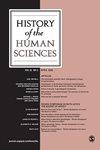承认与否认亲属关系:19世纪移民-殖民国家亲属资料的收集与出版
IF 0.5
2区 历史学
Q2 HISTORY & PHILOSOPHY OF SCIENCE
引用次数: 0
摘要
19世纪下半叶,随着殖民主义的蔓延和遏制和控制定居者殖民国家人民的新政策的制定,人类学乘着现代性的外衣,采用了新的印刷技术,遵循了新的旅行网络,并越来越多地接触到土著人。亲属关系研究的早期创新者刘易斯·亨利·摩根和他的两位最伟大的追随者洛里默·费森和A.W.豪伊特分别在美国、斐济和澳大利亚工作,他们集中体现了治理、表征技术和人类学的融合。他们在日益规范的邮政路线上就亲属关系系统的交替性进行了通信,并利用新闻界的发展发展发展出了新的收集形式和亲属关系的新图示。19世纪的亲属关系研究只关注通过生物学和血统形成的关系,除了这些形式之外,对亲属关系的形成几乎没有认识。这对Howitt来说尤其重要,根据Gunaikurnai亲属关系范式,Howitt最亲密的原住民对话者Tulaba声称他是兄弟。本文追踪了19世纪后半叶英语世界问卷和书籍中亲属关系材料的收集和出版与土著人民的成果之间的联系,因为对独特亲属制度的争论有助于定义他们的“原始性”,并驳斥了原住民跨越定居者/原住民鸿沟建立亲属关系的企图。本文章由计算机程序翻译,如有差异,请以英文原文为准。
Kinship acknowledged and denied: Collecting and publishing kinship materials in 19th-century settler-colonial states
In the second half of the 19th century, anthropology rode the coat-tails of modernity, adopting new printing technologies, following new travel networks, and gaining increasing access to Indigenous people as colonialism spread and new policies were developed to contain and control people in settler-colonial states. The early innovator in kinship studies Lewis Henry Morgan and his two greatest proteges, Lorimer Fison and A. W. Howitt, working respectively in the United States, Fiji, and Australia, epitomised this conflation of governance, technologies of representation, and anthropology. They corresponded on the alterity of kinship systems across increasingly regularised postal routes, and developed new forms of collecting and new diagrammatic representations of kinship using developments at the press. Nineteenth-century kinship studies were focused exclusively on relationships formed through biology and descent, and there was little recognition of kinship making beyond these forms. This was especially significant for Howitt, whose closest Aboriginal interlocutor, Tulaba, claimed him as a brogan (brother), according to Gunaikurnai kinship paradigms. This article tracks the links between the collection and publication of kinship material in the questionnaires and the books of the latter part of the 19th century across the English-speaking world and the outcomes for Indigenous peoples, as arguments for distinctive kinship systems helped define their ‘primitiveness’ and dismissed Aboriginal attempts to forge kinship links across the settler/Indigenous divide.
求助全文
通过发布文献求助,成功后即可免费获取论文全文。
去求助
来源期刊

History of the Human Sciences
综合性期刊-科学史与科学哲学
CiteScore
1.60
自引率
11.10%
发文量
31
审稿时长
>12 weeks
期刊介绍:
History of the Human Sciences aims to expand our understanding of the human world through a broad interdisciplinary approach. The journal will bring you critical articles from sociology, psychology, anthropology and politics, and link their interests with those of philosophy, literary criticism, art history, linguistics, psychoanalysis, aesthetics and law.
 求助内容:
求助内容: 应助结果提醒方式:
应助结果提醒方式:


